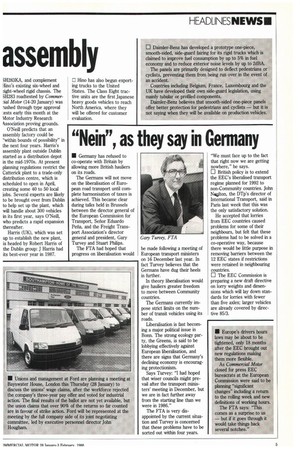"Nein", as they say in Germany
Page 7

If you've noticed an error in this article please click here to report it so we can fix it.
• Germany has refused to co-operate with Britain by allowing more British hauliers on its roads.
The Germans will not move on the liberalisation of European road transport until complete harmonisation of taxes is achieved. This became clear during talks held in Brussels between the director general of the European Commission for Transport, Senor Eduardo Pena, and the Freight Transport Association's director general and president, Gary Turvey and Stuart Philips.
The FTA had hoped that progress on liberalisation would be made following a meeting of European transport ministers on 16 December last year. In fact Turvey believes that the Germans have dug their heels in further.
In theory liberalisation would give hauliers greater freedom to move between Community countries.
The Germans currently impose strict limits on the number of transit vehicles using its roads.
Liberalisation is fast becoming a major political issue in Bonn. The strong ecology party, the Greens, is said to be lobbying effectively against European liberalisation, and there are signs that Germany's declining economy is encouraging protectionism.
Says Turvey: "I had hoped that wiser councils might prevail after the transport ministers' meeting in December, but we are in fact further away from the starting line than we were in 1986."
The FTA is very disappointed by the current situation and Turvey is concerned that these problems have to be sorted out within four years. "We must face up to the fact that right now we are getting nowhere," he says.
British policy is to extend the EEC's liberalised transport regime planned for 1992 to non-Community countries. John No4lton, the Dip's director of International Transport, said in Paris last week that this was the only satisfactory solution.
He accepted that lorries from EEC countries caused problems for some of their neighbours, but felt that these problems had to be solved in a co-operative way, because there would be little purpose in removing barriers between the 12 EEC states if restrictions were retained in neighbouring countries.
The EEC Commission is preparing a new draft directive on lorry weights and dimensions which will lay down standards for lorries with fewer than five axles; larger vehicles are already covered by directive 85/3.
























































































